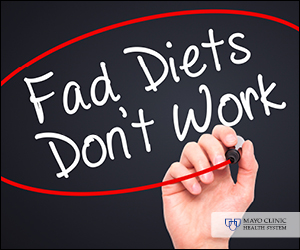Recent Posts
Fad diets: They come and go

We all stress about weight at some point in our lives. Whether it comes from society or the media, there’s a lot of focus on body weight today. No wonder many consumers fall prey to fad diets and bogus weight-loss products. Even the most educated people can become confused after listening to testimonials or claims from the so-called experts. It's this simple: If the weight-loss solution sounds too good to be true, it probably is.
There is no product, pill or weird foods that will instantaneously make fat disappear. No incredible food will change your genetic code. In fact, some ingredients in supplements and herbal products can be dangerous for you.
Registered dietitians recommend that Americans steer clear of any diet plans that include:
- Rapid weight loss
Gradual weight loss is ideal — and lasting. Dramatic and quick weight changes are not healthy. Healthy weight-loss plans aim for half to one pound of weight loss per week. Quick weight loss is likely a result of muscle and water loss. - Quantities and limitations
Avoid diets that allow unlimited quantities of any food. Avoid diets that eliminate or severely restrict an entire food group, such as carbohydrates. A low-calorie, well-balanced diet is the best way to go. Even if you take a multivitamin, you'll miss out on critical nutrients by avoiding entire food groups. - Specific food combinations
No evidence shows that combining certain foods or eating foods at specific times of the day will cause weight loss. Furthermore, eating the wrong combinations of foods doesn't cause rapid fat production or produce toxins in the body. - Rigid menus
Before you start a new fad diet, ask yourself, "Can I eat this way for the rest of my life?" If your answer is no, then the plan is not for you. Following rigid menus can be hard, overwhelming, costly and simply not necessary. - No need to exercise
Regular exercise is essential for good health and weight management. Your goal should be to discover physical activities you enjoy and strive to complete those for 30 to 60 minutes most days of the week.
The moral to the story is: If you want to maintain a healthy weight, build muscle and lose fat — all while enjoying life to its fullest — eat smart and get moving. For a more personalized plan, consult a registered dietitian for more assistance.
Anne Harguth is a clinical dietitian in Nutrition Services in Waseca, Minnesota.





